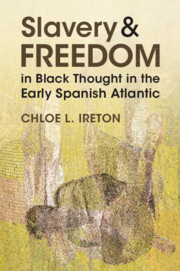Book contents
- Reviews
- Slavery and Freedom in Black Thought in the Early Spanish Atlantic
- Afro-Latin America
- Slavery and Freedom in Black Thought in the Early Spanish Atlantic
- Copyright page
- Contents
- Figures
- Acknowledgments
- Introduction
- 1 Proving Freedom
- 2 Imagining Freedom
- 3 Purchasing Freedom
- 4 Defining Freedom
- 5 Reclaiming Freedom
- 6 Practicing Freedom
- Coda
- Bibliography
- Index
Introduction
Published online by Cambridge University Press: 28 November 2024
- Reviews
- Slavery and Freedom in Black Thought in the Early Spanish Atlantic
- Afro-Latin America
- Slavery and Freedom in Black Thought in the Early Spanish Atlantic
- Copyright page
- Contents
- Figures
- Acknowledgments
- Introduction
- 1 Proving Freedom
- 2 Imagining Freedom
- 3 Purchasing Freedom
- 4 Defining Freedom
- 5 Reclaiming Freedom
- 6 Practicing Freedom
- Coda
- Bibliography
- Index
Summary
This study explores a shared Black Atlantic world where the meanings of slavery and freedom were fiercely contested and claimed. Weaving together thousands of archival fragments, the book recreates the worlds and dilemmas of extraordinary individuals and communities in the long sixteenth century, while mapping the development of early modern Black thought about slavery and freedom. From a free Black mother’s embarkation license to cross the Atlantic Ocean to an enslaved Sevillian woman’s epistles to her freed husband in New Spain, an enslaved man’s negotiations with prospective buyers on the auction block in Mexico City, and a Black man’s petition to reclaim his liberty after his illegitimate enslavement, these actions were those of everyday and extraordinary individuals who were important intellectual actors in the early modern Atlantic world. They reckoned in their daily lives with laws and theological discourses that legitimized the enslavement of Black people and the varied meanings of freedom across legal jurisdictions. They discussed ideas about slavery and freedom with Black kin, friends, and associates in the sites where they lived and across vast distances, sometimes generating spheres of communication that stretched across the early modern Atlantic world. Their intellectual labor reimagined the epistemic worlds of the early modern Atlantic. This introduction provides an outline of the book’s main argument, methodology, and the six chapters and the coda that follow.
- Type
- Chapter
- Information
- Publisher: Cambridge University PressPrint publication year: 2024

